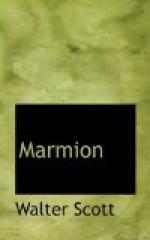’In
a single night,
As men’s
have grown from sudden fears.’
Stanza xxix. line 506. ’St. Regulus (Scottice, St. Rule), a monk of Patrae, in Achaia, warned by a vision, is said, A. D. 370, to have sailed westward, until he landed at St. Andrews, in Scotland, where he founded a chapel and tower. The latter is still standing; and, though we may doubt the precise date of its foundation, is certainly one of the most ancient edifices in Scotland. A cave, nearly fronting the ruinous castle of the Archbishops of St. Andrews, bears the name of this religion person. It is difficult of access; and the rock in which it is hewed is washed by the German Ocean. It is nearly round, about ten feet in diameter, and the same in height. On one side is a sort of stone altar; on the other an aperture into an inner den, where the miserable ascetic, who inhabited this dwelling, probably slept. At full tide, egress and regress are hardly practicable. As Regulus first colonised the metropolitan see of Scotland, and converted the inhabitants in the vicinity, he has some reason to complain that the ancient name of Killrule (Cella Reguli) should have been superseded, even in favour of the tutelar saint of Scotland. The reason of the change was, that St. Rule is said to have brought to Scotland the relics of Saint Andrew.’—Scott.
line 509. ’St. Fillan was a Scottish saint of some reputation. Although Popery is, with us, matter of abomination, yet the common people still retain some of the superstitions connected with it. There are in Perthshire several wells and springs dedicated to St. Fillan, which are still places of pilgrimage and offerings, even among the Protestants. They are held powerful in cases of madness; and, in some of very late occurrence, lunatics have been left all night bound to the holy stone, in confidence that the saint would cure and unloose them before morning. [See various notes to the Minstrelsy of the Scottish Border.]’—Scott.
line 513. Cp. Macbeth, v. 3. 40:—
‘Canst thou not minister to a mind diseased?’
and Lear, iii. 4. 12:—
’The
tempest in my mind
Doth from my senses
take all feeling else
Save what beats
there.’
Stanza XXX. line 515. With ‘midnight draught,’ cp. Macbeth’s ‘drink,’ ii. 1. 31, and the ‘posset,’ ii. 2. 6. See notes to these passages in Clarendon Press Macbeth.
Stanza XXXI. line 534. ’In Catholic countries, in order to reconcile the pleasures of the great with the observances of religion, it was common, when a party was bent for the chase, to celebrate mass, abridged and maimed of its rites, called a hunting-mass, the brevity of which was designed to correspond with the impatience of the audience.’—Note to ‘The Abbot,’ new edition.
line 538. Stirrup-cup, or stirrup-glass, is a parting-glass of liquor given to a guest when on horseback and ready to go.




